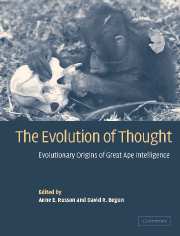Book contents
- Frontmatter
- Contents
- List of Contributors
- Preface
- 1 Evolutionary reconstructions of great ape intelligence
- 2 Enhanced cognitive capacity as a contingent fact of hominid phylogeny
- PART I COGNITION IN LIVING GREAT APES
- PART II MODERN GREAT APE ADAPTATION
- PART III FOSSIL GREAT APE ADAPTATIONS
- Introduction
- 13 Paleoenvironments and the evolution of adaptability in great apes
- 14 Cranial evidence of the evolution of intelligence in fossil apes
- 15 Life history and cognitive evolution in the apes
- 16 Fossil hominoid diets, extractive foraging, and the origins of great ape intelligence
- 17 Paleontology, terrestriality, and the intelligence of great apes
- 18 Body size and intelligence in hominoid evolution
- Part IV INTEGRATION
- Author index
- Species index
- Subject index
13 - Paleoenvironments and the evolution of adaptability in great apes
Published online by Cambridge University Press: 20 August 2009
- Frontmatter
- Contents
- List of Contributors
- Preface
- 1 Evolutionary reconstructions of great ape intelligence
- 2 Enhanced cognitive capacity as a contingent fact of hominid phylogeny
- PART I COGNITION IN LIVING GREAT APES
- PART II MODERN GREAT APE ADAPTATION
- PART III FOSSIL GREAT APE ADAPTATIONS
- Introduction
- 13 Paleoenvironments and the evolution of adaptability in great apes
- 14 Cranial evidence of the evolution of intelligence in fossil apes
- 15 Life history and cognitive evolution in the apes
- 16 Fossil hominoid diets, extractive foraging, and the origins of great ape intelligence
- 17 Paleontology, terrestriality, and the intelligence of great apes
- 18 Body size and intelligence in hominoid evolution
- Part IV INTEGRATION
- Author index
- Species index
- Subject index
Summary
ENVIRONMENTS OF NATURAL SELECTION
Understanding the evolution of great ape cognition depends on identifying past adaptive settings and the factors that influenced early ape cognitive responses. Reconstructing past environments is not sufficient for developing and testing evolutionary arguments. It is the sequence of selective environments in which ancestral apes lived that is essential to determining how great ape mental abilities evolved. This requires us to assess the ways in which environmental settings (i.e., specific habitat reconstructions), trends (e.g., cooling, drying), and variability (e.g., seasonality and long-term oscillation) affected the resources and survival regimes of ancestral great apes – and thus posed adaptive problems in the places where they lived and the time periods when they evolved. This chapter investigates the evolutionary adaptability of great apes in light of local, regional, and global paleoenvironments; the geographic patterns of ape evolution; and the cognitive, social, environmental, and dietary characteristics of living great apes.
PRIOR HYPOTHESES OF GREAT APE COGNITIVE EVOLUTION
Although attempts to define unique aspects of great ape cognition have generated much debate (e.g., Tomasello & Call 1997), great apes appear to have achieved levels of cognitive sophistication and flexibility unknown in other nonhuman primates.
- Type
- Chapter
- Information
- The Evolution of ThoughtEvolutionary Origins of Great Ape Intelligence, pp. 237 - 259Publisher: Cambridge University PressPrint publication year: 2004
- 9
- Cited by



